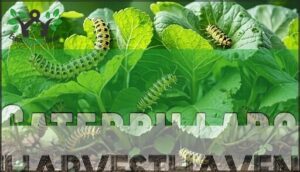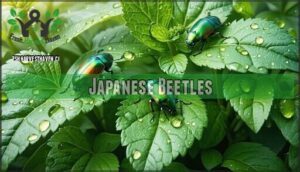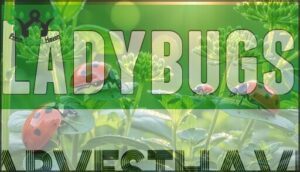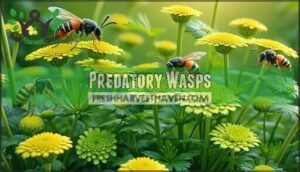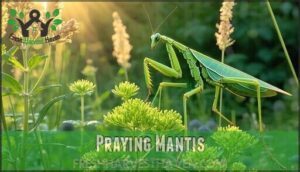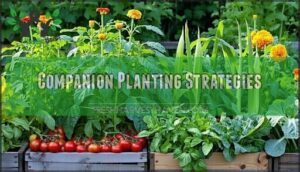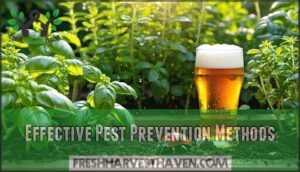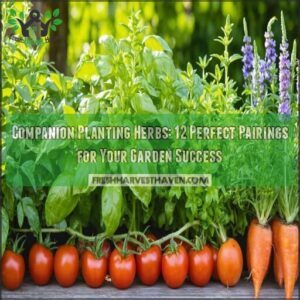This site is supported by our readers. We may earn a commission, at no cost to you, if you purchase through links.
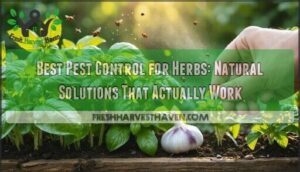 You’ll get the best pest control for herbs using natural methods that keep your harvest safe to eat.
You’ll get the best pest control for herbs using natural methods that keep your harvest safe to eat.
Start with companion planting – basil near tomatoes, mint around garden edges, and garlic throughout your herb beds naturally repel pests.
Introduce beneficial insects like ladybugs and lacewings to eat aphids and other troublemakers.
Neem oil spray works wonders against soft-bodied pests without harming your plants, and physical barriers like row covers protect vulnerable seedlings.
While proper spacing improves air circulation and reduces pest-friendly conditions, daily garden inspections help you catch problems early when they’re easiest to manage.
These strategies work together like a well-orchestrated defense team, creating an environment where your herbs thrive while pests look elsewhere for dinner.
Table Of Contents
- Key Takeaways
- Natural Herb Pest Repellents
- Common Herb Pests
- Biological Pest Controls
- Companion Planting Strategies
- Effective Pest Prevention Methods
- Frequently Asked Questions (FAQs)
- How to control pests on herbs?
- What is safe to spray on herbs?
- What is safe bug repellent for herbs?
- How to get bugs off fresh herbs?
- How to get rid of pests on herbs?
- What is the best pest control for basil?
- Can you use insecticide on herbs?
- How do weather conditions affect herb pests?
- What are signs of pest-resistant herb varieties?
- Can overwatering attract pests to herb gardens?
- Conclusion
Key Takeaways
- Use companion planting strategically – Plant basil near tomatoes, mint around garden edges, and garlic throughout herb beds to create natural pest barriers that repel insects without chemicals.
- Introduce beneficial insects early – Release ladybugs, lacewings, and predatory wasps to control aphids and other pests naturally while they pollinate your herbs.
- Apply neem oil for immediate control – Spray neem oil weekly on affected plants to manage soft-bodied pests like aphids and spider mites without harming your edible herbs.
- Prevent problems with daily inspections – Check plants daily for pest signs, maintain proper spacing for air circulation, and use physical barriers like row covers to stop infestations before they start.
Natural Herb Pest Repellents
You don’t need harsh chemicals to protect your herbs from pests when nature provides powerful alternatives right in your garden.
These five natural herb pest repellents work by releasing strong scents that bugs hate, keeping your plants safe while you enjoy fresh herbs for cooking.
Garlic
Garlic cultivation transforms your garden into a pest-free haven through powerful natural compounds. This aromatic herb works around the clock, deterring slugs, cabbage worms, and root maggots with its sulfur-rich scent.
Garlic’s natural sulfur compounds work like a 24/7 pest security system for your garden.
Garlic’s pungent aroma makes it a natural shield, keeping pests like slugs and cabbage worms far from your garden.
Garlic spray delivers concentrated protection—blend fresh cloves with water weekly for maximum effectiveness. One option is to use vegetable oil sprays to suffocate soft-bodied pests.
Here’s why gardeners swear by this organic pest control method:
- Zero harmful chemicals means your family and pets stay safe
- Immediate results appear within days of application
- Dual-purpose protection guards plants while enriching soil naturally
Garlic benefits extend beyond pest control, offering antimicrobial properties that strengthen plant immunity. This natural pest control champion proves that effective herb pest control doesn’t require synthetic solutions.
Basil
You’ll find basil varieties like sweet basil and Thai basil work as natural insect repellents, deterring flies and mosquitoes with their strong scent.
Growing basil near your herbs creates an organic pest control barrier that protects against aphids and whiteflies.
The basil essential oil in the leaves acts as a powerful herb pest control method.
Culinary basil serves double duty—seasoning your meals while keeping pests away from your garden naturally.
Mint
While basil handles flies and mosquitoes well, mint takes natural pest control to another level. This aromatic powerhouse repels ants, mosquitoes, and flies with remarkable effectiveness.
Mint varieties like peppermint and spearmint contain potent mint oil that insects simply can’t tolerate. The strong scent creates an invisible barrier around your herbs, making it an excellent insect repellent for organic pest control.
Here’s how to maximize mint’s pest-fighting power:
- Plant mint companion varieties near vulnerable herbs
- Use mint propagation through root division for quick expansion
- Harvest leaves regularly to maintain oil concentration
- Container planting prevents mint from overtaking your garden
- Combine mint uses with other natural pest control methods
Be careful though—mint spreads aggressively and can crowd out neighboring plants. Container growing keeps this herb pest control champion contained while delivering maximum protection for your garden.
Lemongrass
While mint tackles everyday garden pests, lemongrass steps up as your mosquito-fighting champion. This aromatic herb pest control powerhouse contains natural citronella oil, making it perfect for organic pest control around patios and herb gardens.
Growing lemongrass varieties couldn’t be easier:
- Plant in sunny, well-drained spots for maximum citronella production
- Water consistently but don’t overwater – soggy roots spell trouble
- Harvest outer stalks regularly to encourage fresh lemongrass oil development
- Crush leaves before planting near seating areas for instant natural pest control
Different lemongrass uses include brewing teas and creating homemade repellent sprays. Your garden gets dual benefits: effective pest control herbs plus culinary ingredients.
Chrysanthemums
While lemongrass offers citronella power, chrysanthemums pack pyrethrum extraction for broader organic pest control.
These natural pest control champions target multiple pests affecting your herbs.
| Pest Type | Chrysanthemum Effect | Growing Tips |
|---|---|---|
| Ants | Repels with pyrethrum compounds | Plant in sunny, well-drained areas |
| Fleas | Disrupts life cycle naturally | Space 12-18 inches apart |
| Bed Bugs | Strong deterrent properties | Harvest flowers when fully open |
| Spider Mites | Effective insect repellent action | Water at soil level, not leaves |
Chrysanthemum varieties serve double duty as stunning cut flowers while providing herb pest control. Their pest spectrum coverage makes them invaluable for organic gardeners seeking natural solutions.
Common Herb Pests
Your herb garden faces four main troublemakers that can quickly turn your thriving plants into pest buffets.
Aphids, caterpillars, Japanese beetles, and cucumber beetles each target herbs differently, but knowing their habits helps you protect your plants before serious damage occurs.
Aphids
Your herb garden’s aphids multiply fast, creating sticky honeydew that attracts sooty mold. These soft-bodied pests damage plants by draining nutrients, causing stunted growth and yellowing leaves.
Controlling aphids requires understanding their lifecycle and using targeted organic pest control methods. Implementing horticultural soaps and neem can help suffocate these soft-bodied pests.
Effective aphid management strategies:
- Release aphid predators like ladybugs and lacewings
- Spray neem oil or garlic solution on affected plants
- Monitor for aphid resistance and rotate treatments
- Remove heavily infested leaves immediately
- Use companion planting to deter future infestations
Caterpillars
While aphids target leaves, caterpillars devour entire herb plants.
Spotting frass identification signals their presence early.
Bt control and diatomaceous earth offer natural solutions for garden pest control.
| Detection Method | Control Strategy |
|---|---|
| Look for chewed leaves | Handpick small infestations |
| Check for dark droppings | Apply Bt spray weekly |
| Monitor caterpillar lifecycle | Use pheromone traps |
| Inspect stem damage | Encourage beneficial insects |
| Watch for webbing | Apply diatomaceous earth |
Natural pest control works best with consistent monitoring and pest control herbs like catnip nearby.
Japanese Beetles
Japanese beetles wreak havoc on herb gardens, chewing through leaves like tiny lawnmowers.
You’ll spot their metallic green bodies clustered on damaged plants.
Trapping beetles with pheromone traps works, but place them away from herbs to avoid attracting more.
Natural predators like birds and beneficial insects help control populations.
Understanding the beetle life cycle helps time your organic pest control efforts.
Resistant herbs like catnip naturally deter these pests through their strong scents.
Cucumber Beetles
While Japanese beetles target foliage, cucumber beetles pose a different threat to your herbs. These striped pests chew through leaves and transmit bacterial wilt, making natural pest control essential for herb pest control.
Seasonal control starts with understanding the beetle life cycle and selecting resistant cucumber varieties for your garden.
- Trap cropping with nasturtiums draws beetles away from valuable herbs
- Natural predators like ground beetles and spiders help control populations
- Row covers protect young plants during peak beetle activity
- Garden pest control includes removing plant debris where beetles overwinter
Biological Pest Controls
When your herbs face pest problems, nature provides some of the most effective solutions through biological controls.
These living allies work around the clock to manage garden pests while keeping your herbs safe for cooking and medicinal use.
Ladybugs
Nature’s most effective aphid assassins consume up to 5,000 soft-bodied pests throughout their ladybug lifecycle.
These beneficial insects excel at natural pest control, especially during their voracious larval stage. Their diverse ladybug diet includes aphids, mites, and scale insects.
Attracting ladybugs requires nectar-rich flowers like dill and fennel near your herbs.
Buying ladybugs online works when local populations are scarce – release them at dusk for maximum effectiveness.
These predators contribute to balanced garden ecosystems, reducing the need for intervention. The ladybug benefits include non-toxic herb pest control that protects edible plants while reducing chemical pesticide dependence in your garden pests management strategy.
Predatory Wasps
While ladybugs tackle aphids head-on, predatory wasps work more strategically.
These tiny beneficial insects don’t just hunt—they’re master infiltrators. Parasitic wasps slip inside caterpillars and beetle larvae, turning pests into their own nurseries.
You’ll attract these wasp species by planting wasp attractants like dill, fennel, and yarrow. They need diverse nesting habitats with shelter and moisture.
These specialists target specific pests without harming pollinators, making them perfect for herb pest management in balanced garden ecosystems.
Lacewings
These green aphid lions pack serious pest-fighting power in your herb garden.
Lacewing larvae devour aphids, thrips, and whiteflies while adults pollinate your plants.
Their lacewing lifecycle guarantees continuous protection—lacewing eggs hatch into hungry predators that consume large numbers of pests.
Attracting lacewings is simple: plant nectar-rich flowers nearby.
These beneficial insects work alongside other biological pest controls for effective pest control.
Praying Mantis
While lacewings handle smaller pests, praying mantis step up as your garden’s heavyweight champions.
These beneficial insects aren’t picky eaters—their mantis diet includes aphids, caterpillars, and beetles that threaten your herbs.
You’ll attract these natural pest control warriors by creating ideal mantis habitats with tall grasses and shrubs nearby.
Their mantis lifecycle guarantees continuous protection throughout growing seasons.
The mantis benefits extend beyond pest elimination—they’re nature’s surveillance system, patrolling your garden day and night.
Plant diverse herbs to support these garden pests predators.
Consider purchasing a specialized habitat kit for them.
Neem Oil
This botanical wonder contains neem oil and over 100 active compounds that disrupt insect feeding and reproduction cycles.
You’ll control aphids, mites, and caterpillars while keeping your herbs safe.
Mix 1-2 tablespoons per gallon of water for neem oil application.
Apply early morning or evening for best neem oil benefits and effective organic pest control.
The active compound in neem, azadirachtin disrupts insect growth.
Companion Planting Strategies
You’ll transform your herb garden into a pest-fighting fortress by pairing compatible plants that naturally protect each other.
Strategic companion planting creates a living defense system where aromatic herbs like basil and mint work alongside your crops to repel insects while boosting overall garden health.
Basil and Tomatoes
Pairing basil with tomatoes is a classic move for any gardener wanting both Flavor Enhancement and effective pest control.
Basil Varieties naturally repel Tomato Hornworms and are champions at Aphid Deterrence, keeping your tomatoes safer from common garden pests.
This companion planting isn’t just about keeping bugs away—it also boosts Growth Support, helping both plants thrive.
Plus, the basil’s aroma enhances your tomatoes’ taste, making your harvest a win-win. It’s teamwork at its tastiest and most practical.
Mint and Tansy
When you’re looking for natural pest control, mint varieties and tansy create powerful insect repellent barriers through companion planting.
Mint companion plants deter cabbage loopers and mites with aromatic compounds, while tansy uses include repelling ants and beetles.
These herbs thrive in similar growing conditions, making them perfect partners.
Mint also benefits from strategic placement, as eggplant offers shade that reduces soil temperature.
However, remember tansy toxicity – keep it away from pets and children while enjoying its protective benefits.
Chives and Lettuce
Chives serve as natural bodyguards for your lettuce, releasing sulfur compounds that repel aphids and slugs.
Chive benefits include year-round pest deterrence while supporting companion advantages through lettuce protection. This companion planting strategy enhances flavor enhancement naturally.
Pest control herbs work best when you:
- Plant chives 8-12 inches from lettuce rows
- Space plants properly for air circulation
- Inspect leaves daily for early detection
- Rotate crops annually to break pest cycles
Dill and Fennel
While chives work well with lettuce, dill and fennel take companion planting to another level. These aromatic herbs serve as natural bodyguards for your garden, tackling dill pests and fennel diseases before they spread.
Dill excels at repelling aphids and spider mites while attracting beneficial parasitic wasps. Its essential oils containing carvone and limonene provide strong insect repellent properties.
However, keep dill away from tomatoes since it can attract hornworms to those plants.
Fennel complements dill perfectly by deterring snails and slugs with its trans-anethol compounds. Both herbs attract ladybugs and lacewings that devour aphids naturally.
Their growing conditions overlap nicely – they prefer full sun and well-draining soil.
aggressively
These companion herbs also offer culinary uses – fresh dill enhances fish dishes while fennel adds licorice notes to salads.
Catnip and Garden Protection
While dill and fennel work well as pest deterrents, catnip offers broader garden protection through its powerful nepetalactone compound. This natural insect repellent effectively controls aphids, Japanese beetles, and cucumber beetles while attracting beneficial predators like ladybugs.
Consider these catnip benefits for strategic planting:
- Plant near tomatoes and peppers to reduce aphid infestations by up to 30%
- Use as border plants to deter flea beetles and squash bugs
- Harvest leaves regularly to maintain peak oil concentration and pest deterrence
- Space plants properly to avoid attracting neighborhood cats to your garden
- Combine with other herbs for thorough natural pest control coverage
Effective Pest Prevention Methods
Prevention beats treatment in protecting your herb garden from pests. You’ll save time, money, and your plants by catching problems early and creating conditions that discourage infestations before they start.
Daily Inspections
Since daily inspections catch problems before they spiral out of control, you’ll want to scout your herb garden regularly for early detection of troublemakers.
Check under leaves and along stems for eggs, larvae, or damage signs.
Identifying signs quickly prevents small issues from becoming major headaches.
Monitoring frequency should increase during peak pest seasons when garden pests are most active, making daily inspections your best defense for effective pest prevention.
Proper Plant Spacing
Your herb garden needs breathing room.
Air circulation and sunlight exposure improve when you space herbs 12-18 inches apart, reducing pest-friendly damp spots by 30%. Proper plant spacing prevents overcrowding, enhances root development, and creates healthier plants that naturally resist garden pests.
Well-spaced herbs also make pest control treatments easier to apply, supporting your natural pest control strategy through smart growth optimization and disease prevention.
Companion planting can further help, as certain herbs repel pests.
Crop Rotation
After your plants are well-spaced, crop rotation becomes your secret weapon against persistent pests.
This yearly shuffle disrupts pest cycles that build up in soil, while boosting nutrient management and soil health.
Here’s your rotation game plan:
- Move aphid magnets like chives away from last year’s spots
- Separate garlic from carrot family plants to dodge carrot flies
- Introduce marigolds into fresh locations for natural pest deterrence
Smart seasonal planning keeps pests guessing.
Physical Barriers
While crop rotation disrupts pest cycles in your soil, you can add another layer of protection with smart physical barriers.
Row covers let sunlight through while blocking flying pests, reducing access by up to 90%. Copper tape creates an electric barrier that slugs won’t cross. You can find various copper tape options online.
| Barrier Type | Target Pests | Effectiveness |
|---|---|---|
| Fine mesh netting | Aphids, beetles | 85-95% |
| Row covers | Caterpillars, moths | 90-95% |
| Sticky traps | Flying insects | 70-80% |
| Copper tape | Slugs, snails | 95% |
| Garden fencing | Rabbits, deer | 99% |
Regular barrier maintenance keeps your herb protection system working year-round through seasonal deployment adjustments.
Healthy Soil Maintenance
Physical barriers work from the outside, but healthy soil maintenance creates defense from within.
Your soil structure and microbial life determine whether herbs thrive or struggle.
Maintain soil pH between 6.0-7.0 and add organic matter like compost to boost nutrient balance.
Strong soil fertility makes herbs naturally pest-resistant, while poor conditions leave them vulnerable to attack.
Frequently Asked Questions (FAQs)
How to control pests on herbs?
Like a knight’s armor shields against arrows, companion planting creates natural barriers around your herbs.
Plant basil near tomatoes, use marigolds as pest deterrents, and apply neem oil for organic protection.
Daily inspections catch problems early.
What is safe to spray on herbs?
You can safely spray neem oil, insecticidal soap, or diluted essential oils like peppermint on herbs. These organic solutions won’t harm your plants or make them unsafe to eat.
What is safe bug repellent for herbs?
Think of your herb garden as a fortress needing gentle guards.
You can safely use neem oil, insecticidal soap, or diatomaceous earth on herbs.
These natural options won’t harm you when harvesting.
How to get bugs off fresh herbs?
Rinse herbs under cool running water, then gently shake dry. For stubborn bugs, soak in salt water for 5-10 minutes before rinsing again thoroughly.
How to get rid of pests on herbs?
Coincidentally, when herbs attract pests, they’re calling for the same natural defenses that protect them in the wild.
You’ll want to spray neem oil or insecticidal soap directly on affected areas, ensuring you coat both leaf surfaces thoroughly.
What is the best pest control for basil?
You’ll want to use companion planting with herbs like mint and chives around your basil to naturally repel aphids and flies.
Neem oil spray works effectively for infestations while staying organic-friendly.
Can you use insecticide on herbs?
You can use insecticides on herbs, but choose organic options like neem oil or insecticidal soap. Avoid synthetic chemicals near harvest time since you’ll eat these plants.
How do weather conditions affect herb pests?
Weather conditions create perfect storms for herb pests.
High humidity breeds fungal diseases and aphids, while hot, dry spells stress plants, making them vulnerable.
You’ll find spider mites thriving in heat and slugs appearing after rain showers.
What are signs of pest-resistant herb varieties?
Incredibly hardy herb varieties practically laugh at pests.
You’ll spot thick, waxy leaves, strong aromatic oils, dense growth patterns, and natural compounds that make insects flee like they’ve encountered their worst nightmare, with strong aromatic oils being a key factor.
Can overwatering attract pests to herb gardens?
Yes, overwatering creates soggy soil that attracts fungus gnats, root rot, and other moisture-loving pests. You’ll see these critters thriving in waterlogged conditions around your herbs.
Conclusion
Why struggle with chemical pesticides when nature provides effective alternatives?
Natural pest control methods protect your herbs while keeping your harvest safe for consumption. You’ll find success combining companion planting, beneficial insects, and organic sprays like neem oil.
Daily garden inspections catch problems early, while proper spacing and physical barriers prevent infestations.
The best pest control for herbs involves creating a balanced ecosystem where beneficial organisms thrive and pests can’t establish themselves effectively, using methods like organic sprays.


